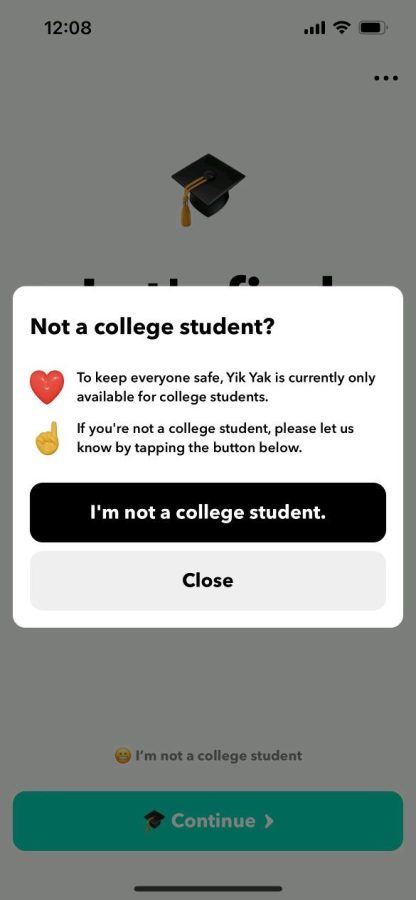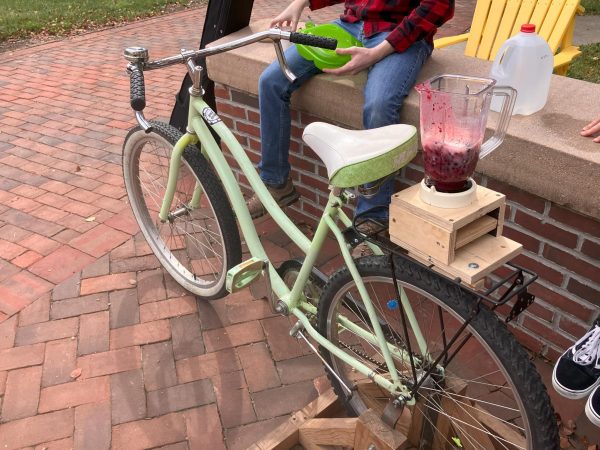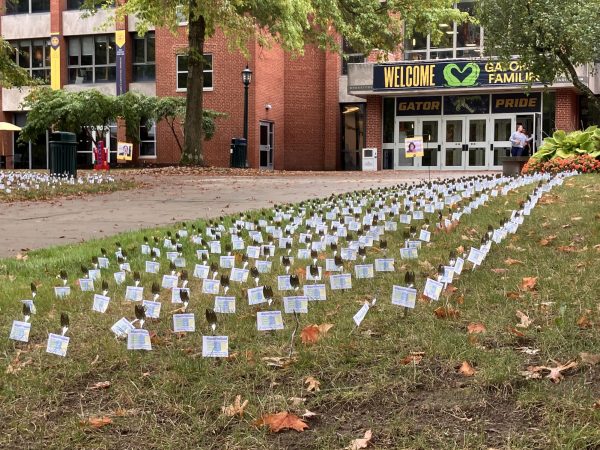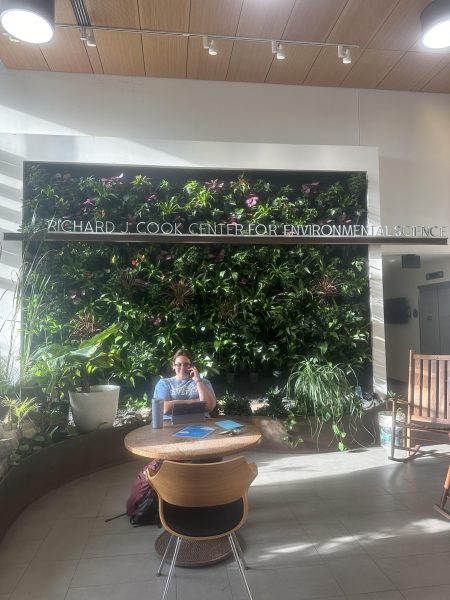Yik Yak at Allegheny
A ‘bloody mess,’ a trip to the ICU, and one troubled app
Screenshot courtesy of ETHAN WOODFILL
Yik Yak has recently rebranded itself as an app only for college students. In order to join a local college community, users must sign in with a college affiliated email address. Otherwise, users can only access global, topic-specific forums.
Content warning: This story contains mention of sexual harassment and suicide.
Gators from all parts of the campus community received an email alerting them to an increased police presence on campus shortly after 4 p.m. on Sunday, April 2. The message cited “unsubstantiated aggressive messages on the social media platform YikYak” as the reason for the mobilization.
The email appeared to be in response to messages posted in the previous few hours. In the first message, posted around 1:30 p.m., someone said that they were “Going to turn brookes into a bloody mess at 6pm.” An hour later another one appeared: “Everybody chill I was talking about pooping at Brookes not shooting it up chill out.”
Despite the follow-up, the college remained on alert until more was known about the situation.
“We did see the post about this could be in reference to bowel movements, but we decided err on the side of caution,” Dean for Student Life Trae Yeckley said in a virtual interview last week. “It could be interpreted as a threat or could be interpreted as upset stomach issues.”
The threat was considered “unsubstantiated” because there was no corroboration suggesting that it could happen, according to Public Safety Director Jim Basinger.
Just after 5 p.m. another message was sent out: The author had been found and the matter resolved.
“The student is being held accountable and we are going through our conduct process,” Yeckley said.
The false alarm came three days after hoax 911 calls alleged that multiple schools across the state — including Meadville Area Senior High School — would be targets of violent attacks, according to the Meadville Tribune.
The April 2 incident is part of what some in the campus community have described as a noticeable shift — for the worse — in Yik Yak’s already-troubled atmosphere. The app, which allows college students to anonymously post to a shared page, was initially launched in 2013 but quickly became associated with cyberbullying, threats of violence and racist speech, according to the New York Times. After users began quitting the app en masse, it shut down in 2017, only to reappear in August 2021 touting a new focus on mental health and user safety.
Yik Yak at its worst
Despite new safeguards, harassment and cyberbullying persist on the platform.
One former student, who requested anonymity out of concern for retaliation, said they were a “casual user” — not posting, not commenting, just scrolling through an app they said “never really had a lot of good in it.”
Earlier this semester, they opened Yik Yak to find their name posted, and the harassment that followed pushed them to attempt suicide.
“I’m OK now, but it was the catalyst for that,” the former student said in a phone interview this week. “I had to go to the ICU and inevitably the psych ward.”
While they declined to speak on the specifics of the college response, the former student said the college “didn’t bother” with trying to find the people who harassed them, which was disappointing in their eyes.
“I mean, I get it,” they said. “They didn’t really do anything besides bullying.”
Because of the incident, the student has since transferred from Allegheny. They hope that people will not use the Yik Yak to confront people or judge people based solely on what is posted by an anonymous source.
“Just don’t be a f—ing a–hole,” they said. “Don’t name drop people.”
Yeckley declined to comment on the specifics of the case.
“What I can say is … just because you can post something from behind your keyboard and you may think it’s funny, or you may think that people aren’t going to read it, your words, even if your name isn’t behind it, your words have impact,” Yeckley said. “There’s a relation between cyberbullying and mental health issues, including depression, anxiety, substance abuse and suicide ideation.”
Other students who have been mentioned by name have faced sexually degrading comments on Yik Yak, including one incident from last month.
“I had a ritual of checking Yik Yak in the morning, saw that I was name-dropped — it was kind of silly at first, just ‘are you single?’” said a current student, who requested anonymity to protect their privacy. “I responded, ‘no,’ and from there it became perverse and sexually harassing.”
Yik Yak’s “Community Guardrails” forbid users from posting names or other identifying personal information on the app, but rely on users to downvote and report posts that violate those guardrails.
Until last month, the app grouped “yakkers” by location, but starting on March 16, Yik Yak’s website advertised the service as a place to specifically connect with people from a college. Yakkers that were once required to provide a phone number for verification are now also required to provide a student email address to verify that they attend the school they claim to.
Non-college student users who log on are now greeted with the following message: “To keep everyone safe, Yik Yak is currently only available for college students.”
The student noted that the other members of Allegheny’s “herd” — as a Yik Yak space is known — are quick to reply and downvote sexist content. Still, the student added, it is concerning that the harassment on the app emerges definitively from the Allegheny community.
“Not only do you not know who it is, but because you don’t, it’s very unsafe,” the current student said. “It could be one of your friends, it could be someone who lives in your hall, so it adds this certain fear to the normalized type of bullying that happens in-person.”
ID without IP
In theory, the platform is not entirely anonymous: Yik Yak says it retains the date and time an account logs in, the group they logged in to, the phone number provided to first launch the app, and the “user-agent string” of the device used to post.
A “user-agent string” is a line of information that identifies the web browser being used to connect to the internet, according to WhatIsMyIPAddress.com. This is separate from the more widely known Internet Protocol address, which identifies the device being used to connect to the internet.
On a page specifically dedicated to the topic, the app says that it will provide this personal information to law enforcement — and only law enforcement — under a court order, subpoena or search warrant. Yik Yak will also provide the information in emergencies, “to prevent death or serious physical harm to someone,” citing kidnapping, bomb threats, school shootings or suicide threats as examples.
The college has yet to request any personal information in any case, but has adjudicated several cases originating from the app, according to Yeckley.
“The way that we have been able to identify students on campus is, it’s a small campus and students like to share, ‘oh, did you see my posts’ or are together when they’re posting and then it gets back to us,” they said. “We have not been able to have Yik Yak turn over identifying information yet.”
The college itself does not have the capability to track the IP addresses of Yik Yak users, according to Information Technology Services.
Close to home
As for the current student who experienced sexual harassment in March, their harasser turned out to be someone they had known and talked with before.
“There was this person that I just — he was very ‘sus,’ so I told the Title IX person and then I posted something on my story like ‘they found the IP address’ and he hit me up on Snapchat like, ‘what’s going to happen,’” the student said. “Then it was pretty much revealed that yeah, he did it … . He’d asked me out like twice. He refused to stop talking to me. I don’t know why he didn’t get the hint in the first place.”
While the perpetrator was identified, the current student felt that the college should be more proactive in interdicting harassment and other unsafe behavior on Yik Yak.
“I think it should definitely at least be monitored better by the school — banned, hopefully — just because it’s not a healthy app,” the student said.
While several administrators are on the app, Yeckley said that it is not a space that the college can police.
“I’ve got some parents who have called me, they said ‘we’ve seen this on your Yik Yak site, how can Allegheny let this happen?’” Yeckley said. “And we have to remind them, this is not Allegheny’s site, we don’t control what’s on the site.”
While the college has considered the idea of taking down the app from Allegheny’s network, doing so would not necessarily eliminate the use of the app on the campus.
“The bottom line is if you banned it from our servers you can still use it on cellular data,” Yeckley said. “You know how wonderful the Wi-Fi is on campus and how many students depend on the cellular data anyway, so it really wouldn’t do much to curb it.”
Exit, stage left
Sometimes, online harassment can start as what seems to be just a mischievous joke — like in an incident last semester during the production of “A Doll’s House, Part 2.”
“Apparently one of the backstage crew members had posted a Yik Yak saying something about not being ready for tech rehearsal,” said Sydnie Patton-Johnson, ’23, the production’s stage manager. “The actors were curious on who said it. So they were kind of Yik Yaking back and forth with this person and they basically were like ‘hey, you’re gonna be late to tech rehearsal.’”
The cast began messaging the first-time crew member, telling them the rehearsal had already started. When the crew member replied that it was not scheduled to start yet, the cast replied back that the times had been changed and that the production was meeting right then.
At one point, a college faculty member even joined in; Patton-Johnson said that a professor involved in the production grabbed a student’s phone and wrote yaks of their own.
“This professor in particular was just being part of the ‘fun’ I guess,” Patton-Johnson said. “Unfortunately, he was the one I yelled at the most to be like ‘you have to apologize’ and stressing that the whole point of theater is it being a community and the fact that — I understand that students are going to do dumb students things, but from a professor you need to hold yourself to a higher standard.”
Patton-Johnson said that someone “took it too far” — pushing the crewmember to quit the production that same day.
“Apparently somebody had called him a name, I don’t remember what it was, it was some type of curse word,” Patton-Johnson said. “I think that is what basically caused him to leave. He didn’t say anything (to me) about leaving, he didn’t say, ‘hey I didn’t feel comfortable.’”
In contrast to the flurry of words on Yik Yak, Patton-Johnson said that when the crewmember arrived none of the involved cast members greeted him or apologized. Even when prompted, she said the yakkers just shrugged.
“I thought that was weird because it was like you had no problem saying this, that on Yik Yak, but when it came to that person being in person, there was just radio silence,” Patton-Johnson said.
Patton-Johnson said when the production met again the following day, cast members expressed remorse for what had happened and said their intention was not to push the crewmember out.
“I don’t think it was necessarily malicious,” she said. “I think it was just being annoyingly mean. Not malicious, but the type of mean when you think you’re being funny in the moment but then afterwards, once you realize someone’s hurt, you feel really bad about it.”
To Patton-Johnson, the app’s inherent structure is at least partly to blame; because the crewmember was anonymous, the cast members pushed him into arriving earlier to discover his identity while simultaneously using their anonymity as a shield.
“Honestly, I don’t think this would have happened if we didn’t have Yik Yak,” she said. “Everybody’s going to have bad thoughts and bad behaviors. This is a matter of — one, if you’re going to say it. And two, where you’re going to say it at. Are you going to say it at something where it is attached to you or where it’s not attached to you?”
Moving forward
Students that are on the app do have some power to shape the platform for the better — they can report harassment and other toxic content to the platform’s content moderation team, and can fast-track the removal process with enough downvotes. If five more people downvote a post than upvote it, the post is automatically removed.
Immediately downvoting a post out of existence makes it hard to track or preserve harmful content, however. Yeckley encouraged students to screenshot anything they think the college should know about in case it is downvoted out of the feed.
In the meantime?
“Yik Yak has disappeared before,” Yeckley said. “I’m hopeful that it disappears again. I think a lot of college administrators — not just at our college but a lot of college administrators across the country — feel very similarly about it.”
Similar sentiments have been stated before in The Campus. In November 2014, when Yik Yak was just a year old, Lucas Proper, ’18, penned an op-ed about the nascent platform.
Proper recounted similar experiences: Racist and sexist comments, “booty-calls,” occasional relatable jokes, and, too often, bullying and general harassment.
“It is disturbing to read the commentary taking place among a small number of our students. Some of the messages are intended to hurt others, and we find some of the jokes and comments to be racist, sexist and homophobic. This type of behavior creates tension within our community and does not represent the values inherent in our Statement of Community,” wrote then-Dean of Students Joseph DiChristina in an email Proper quoted.
“We as a community need to take this more seriously and think about the people who are possibly being harassed,” Proper wrote. “We should also take a look and imagine how nearby outsiders of our community view us as a result from these posts.”
Proper ended his piece on a melancholic note, hoping Yik Yak’s time on campus would be short or students would lose interest in it. It seems students did not; the app only fell out of the public view when it was shut down in 2017.
Allegheny seems to have returned to a similar precipice. Back in 2014, Proper thought awareness of the harm Yik Yak causes could move the community to implement change.
“Until that happens,” Proper wrote, “I hope that the bullying taking place begins to disappear with the help of other students who are willing to take action.”

Sami Mirza is a senior from many different places. He is majoring in International Studies with a focus on the Middle East and North Africa and minor in...










